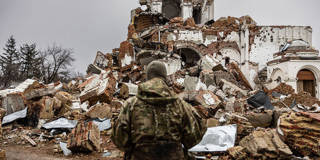If Ukrainian leaders refuse to negotiate with Russia until after Ukraine crosses the threshold of war exhaustion, the outcome will be far worse than if they attempt to negotiate while they still have chips to bargain. Peace by exhaustion is better than no peace at all.
TEL AVIV – While wars invariably end, the underlying disagreements often remain. The peace is tenuous and interrupted by spasms of violence. The way a war ends – whether through outright victory, exhaustion, or mutual deterrence – might make a difference, with exhaustion less likely to prevent future flare-ups than, say, the wholesale defeat of one party. But this is not guaranteed. It certainly does not mean that some types of peace are not worth pursuing.

TEL AVIV – While wars invariably end, the underlying disagreements often remain. The peace is tenuous and interrupted by spasms of violence. The way a war ends – whether through outright victory, exhaustion, or mutual deterrence – might make a difference, with exhaustion less likely to prevent future flare-ups than, say, the wholesale defeat of one party. But this is not guaranteed. It certainly does not mean that some types of peace are not worth pursuing.